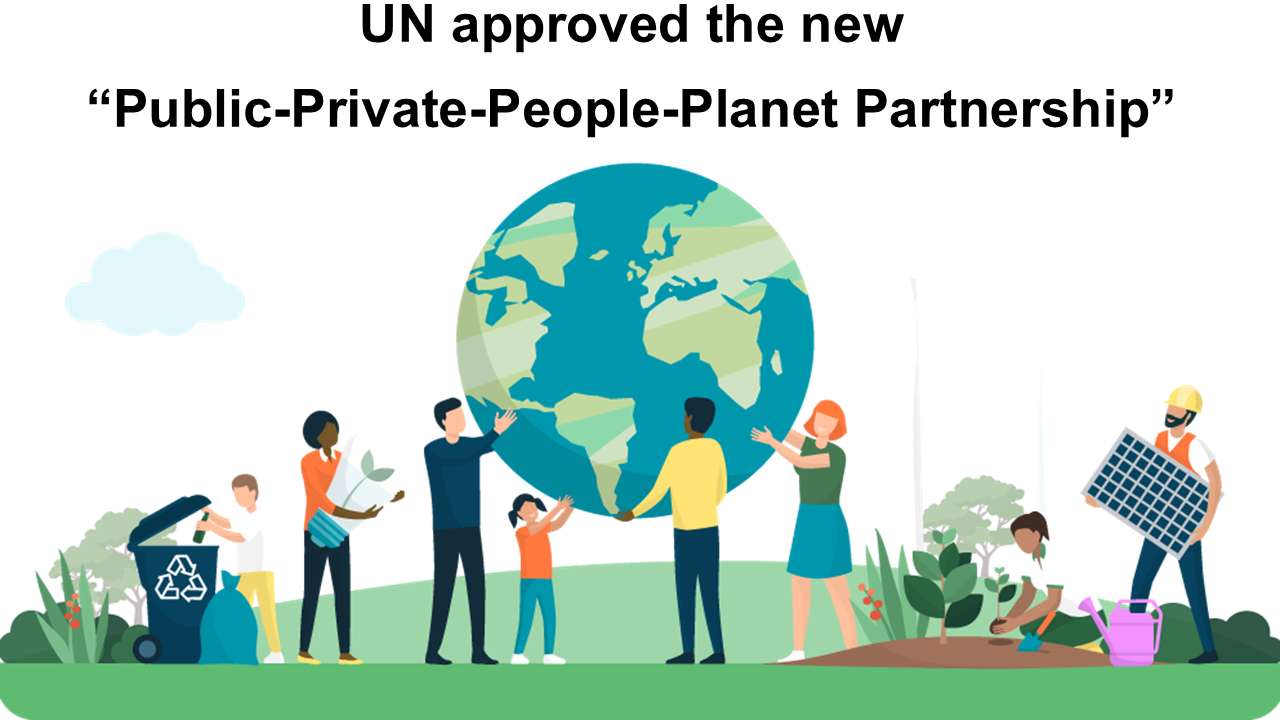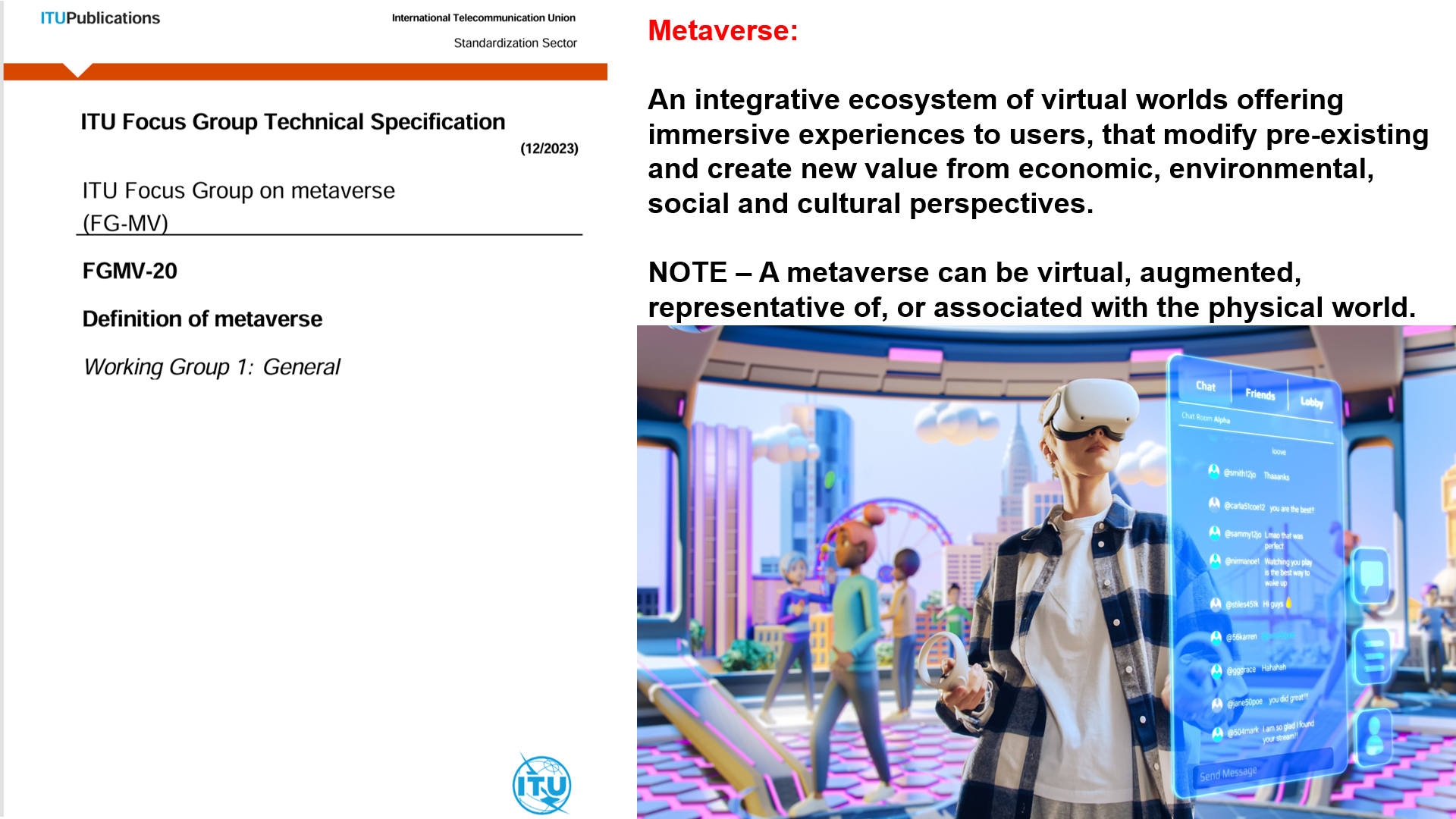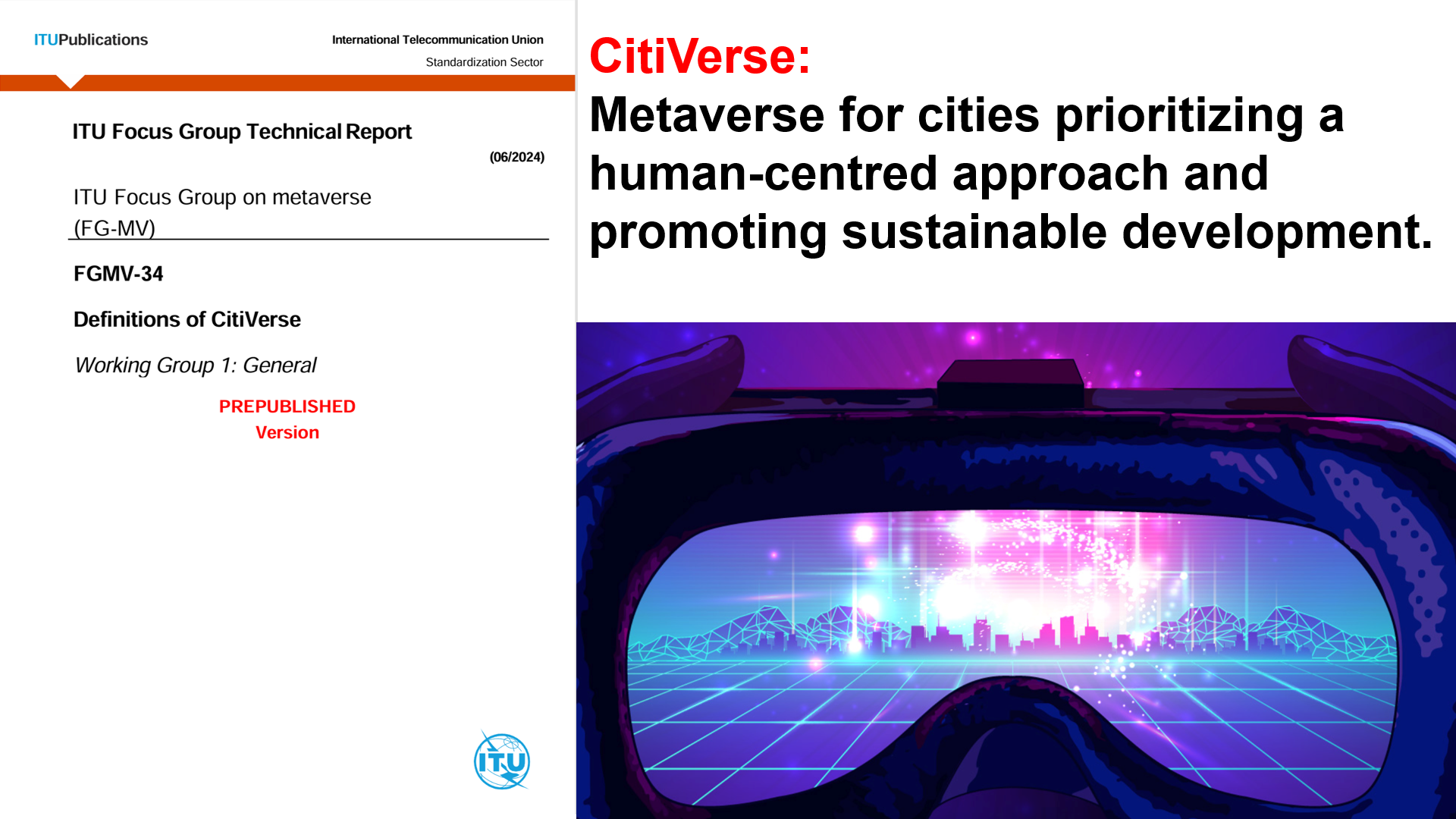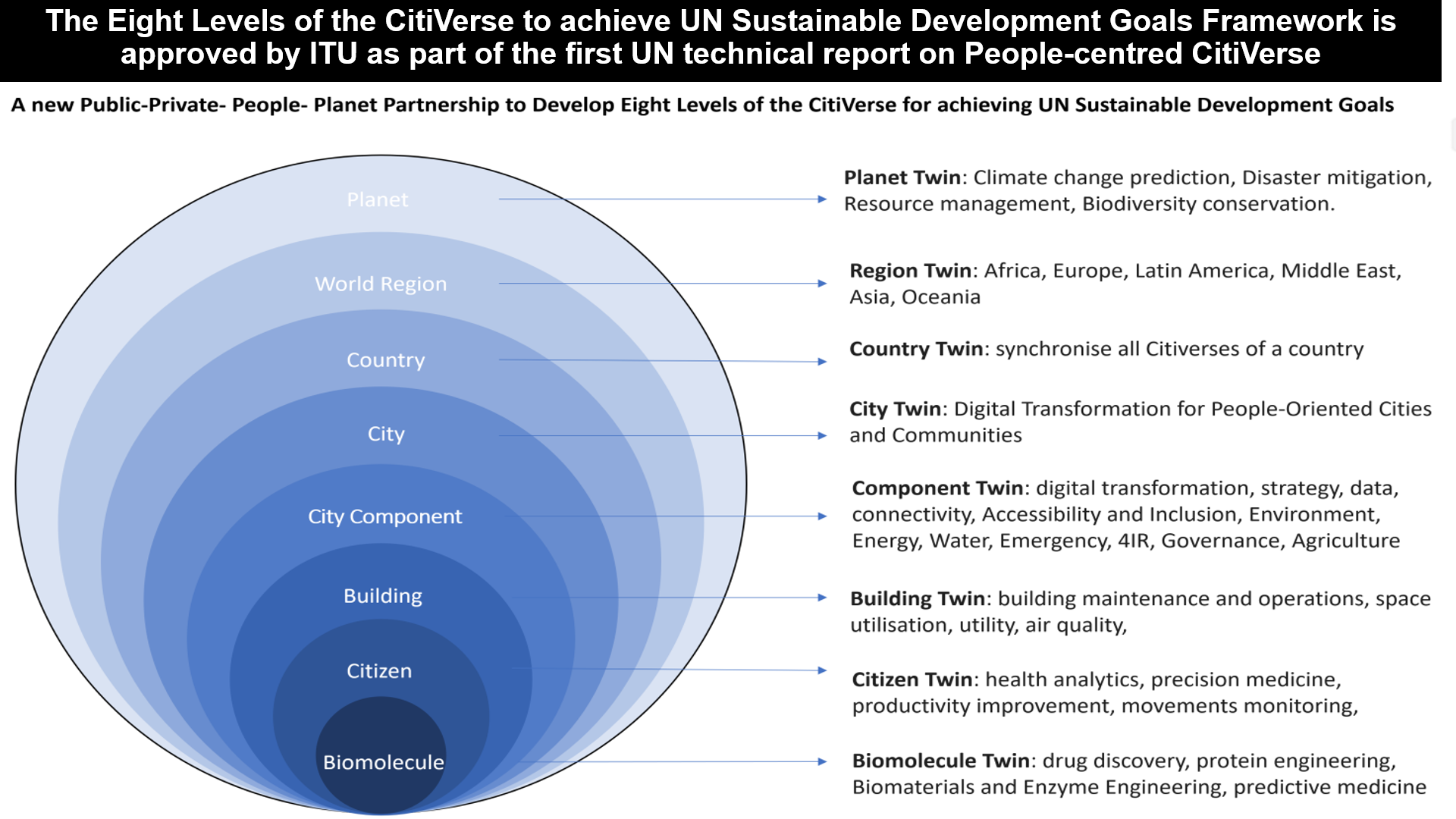The UN CitiVerse Initiative and Immersive Technologies for UK Smart Cities
In an era defined by rapid technological advancement, cities globally are grappling with unprecedented challenges, from rapid population growth (with nearly 70% of the world's population expected to live in cities by 2050, largely in the Global South) to complex infrastructural and environmental pressures. Digital technologies offer powerful solutions, but early "smart city" initiatives often fell short by prioritising tech over people, leading to concerns about inclusivity, privacy, and true citizen engagement.
This is where the UN CitiVerse Initiative steps in. I have been lucky to serve as UN ITU Co-chair on Pre-standardisation for the CitiVerse TaskGroup, exploring the use of AI and virtual worlds to develop people-centred smart cities. I am the author of "People-Centred CitiVerse" – the UN's first approved technical report on the subject – which introduced an 8-level entry point for a people-centred and planet-friendly digital future. My co-authorship extends to UN reports such as "Definition of Metaverse," "Metaverse for All Part I Legal Framework," and "Part II Survey," alongside contributions to the "Future of Travel in the Metaverse" in collaboration with UN Tourism and the "Definition of CitiVerse." Here you can find out more information about the CitiVerse standards we have been developing at the UN.
From Smart Cities to People-Centred CitiVerse
The concept of a "smart city" has evolved significantly. While early efforts focused on sectoral improvements like traffic or waste management, they often failed to address systemic issues such as health, affordable housing, or social exclusion.
The UN-Habitat People-Centred Smart Cities initiative, launched in 2020 and reinforced by 193 countries in June 2023, provides a global framework for inclusive, sustainable, and resilient urban development. It defines people-centred smart cities as those that "leverage data, technology and services for common good, delivering the inclusive and sustainable cities that are needed in the 21st century."

The CitiVerse builds on this, leveraging the collective force of immersive technologies (like Augmented and Virtual Reality) and enabling technologies (such as AI, IoT, blockchain, and digital twins) that underpin the metaverse. It envisions an interconnected virtual and physical urban ecosystem where tangible and intangible real-world objects interact with a city’s digital twin, all fundamentally driven by the needs of its inhabitants. This approach transcends traditional sectoral silos, adopting a holistic "systems approach" to urban management.

The UN approved a new type of public private partnership.
Policymakers across the world will be familiar with the concept of the Public-Private Partnership (PPP); collaborations between government agencies and private sector companies to finance, build and operate projects.
We propose a similar partnership approach for the development of the CitiVerse and its various components; but in addition, this should be one that explicitly identifies social welfare and environmental protection as priorities from the outset, and ensures its deliverables are in line with these priorities. We propose the term Public-Private-People-Planet Partnerships (PPPPPs) to make this prioritisation explicit.

A Framework for Eight Layers of the CitiVerse:
We propose an eight-layer conceptual framework for the development and implementation of a CitiVerse, as a way to identify and prioritise its capabilities for particular policy contexts.
The key differentiator of the CitiVerse concept is that it goes beyond existing smart city approaches, helping cities and communities to bridge sectoral silos and adopt a systems approach to urban management and development. This approach should be driven by a shared vision of the right to a sustainable and just city for all.

The Power of Digital Twins Across Scales
A central pillar of the CitiVerse is the digital twin concept, which offers transformative potential across multiple scales:
- Planet Twin (e.g., EU's Destination Earth): Imagine a highly accurate digital model of the Earth, leveraging AI and high-performance computing to monitor, simulate, and predict environmental impacts. This €3 billion project aims to improve disaster preparedness, optimise resource management, and accelerate progress towards the UN SDGs.
- Country Twin (e.g., Singapore's Virtual Singapore): A national digital twin, incorporating real-time data and simulations of an entire country's infrastructure and trends, promises to optimize urban planning, enhance emergency preparedness, and personalise citizen services.
- City Twin: While challenging to achieve full city-wide integration, solutions are emerging. ABI Research predicts that by 2030, approximately 700 cities will have deployed some form of metaverse infrastructure, offering immersive virtual environments for urban planning and citizen participation.
- Component Twin (e.g., UK's National Grid Virtual Energy System): The UK's world-first digital twin of its entire electricity network aims to deliver £1 billion in annual cost savings by 2030, a 5 million tonne CO2 emission reduction, and 50% faster fault response times, revolutionising grid management and decarbonization efforts.
- Building Twin (e.g., Vancouver International Airport): A digital replica of an airport using 3D models and real-time data has led to a 5% reduction in boarding times and a 10% reduction in baggage handling delays, significantly improving passenger experience and operational efficiency.
- Citizen/Human Twin: Beyond infrastructure, digital twins are revolutionising healthcare. A remarkable example is the successful separation of conjoined twins with fused brains, where surgeons collaborated virtually across continents, practicing the complex procedure countless times in a VR environment based on 3D human models. This "space-age stuff" highlights the potential for enhancing surgical precision, facilitating global collaboration, and improving patient outcomes.
- Biomolecule Twin: Even at the molecular level, digital twins hold promise for drug discovery, personalised medicine, and understanding diseases, simulating how potential drugs interact with biomolecules at an atomic level.
Towards a Standardised and Inclusive CitiVerse
Despite this immense potential, challenges remain, including interoperability, digital identity, and jurisdiction. Open platforms like the International Telecommunication Union (ITU)'s Focus Group on Metaverse are crucial, paving the way for standardisation to ensure seamless interoperability and ethical deployment aligned with the SDGs. The ITU is actively working on an international definition of the CitiVerse, while the European Commission defines it as "a series of interconnected and distributed hybrid and virtual worlds representing, and synchronized with, their physical counterparts."
The core differentiator of the CitiVerse concept is its ambition to break down existing sectoral silos within cities, driving a systems approach to urban management and development that is fundamentally centred on the right to a sustainable and just city for all. As technology continues to evolve, the collaborative efforts of global bodies and local innovators are crucial to ensure the CitiVerse becomes a truly inclusive and transformative force for urban futures.
The UK is already a leader in the development and adoption of digital twin technologies, with initiatives like the National Digital Twin Programme (NDTP) aiming to foster research, standards, and applications across various sectors. The UK Digital Twin Centre in Belfast, backed by Innovate UK, is set to deliver up to £62 million in economic benefit by supporting businesses in adopting these technologies, particularly in areas like aerospace, maritime, and defence. Beyond these examples, the adoption of a holistic CitiVerse approach offers the UK a significant opportunity to drive economic growth, enhance public services, and meet critical national objectives such as net-zero targets. By leveraging immersive environments for urban planning, infrastructure management, and public engagement – as seen in projects like the National Grid's Virtual Energy System and Nottingham's city centre digital twin – the UK can optimize resource allocation, reduce carbon emissions, improve resilience to shocks, and create highly skilled jobs. Furthermore, the development of citizen-centric applications, building on the success of digital twins in healthcare and education, can lead to a more satisfied, healthier, and engaged population, while establishing the UK as a global benchmark for responsible and impactful frontier technology deployment.
The Path Forward: A Call to Action for the UK's Digital Future
The vision of a people-centric CitiVerse, powered by immersive and AI technologies, offers an unparalleled opportunity for the UK to cement its leadership in the global digital economy. We've seen how digital twins are already delivering tangible benefits, from optimizing national energy grids to revolutionising healthcare. Now is the time to embrace a more integrated, holistic approach.
For the UK to truly capitalize on this potential, a concerted effort is needed from policymakers, industry, academia, and citizens alike. We must foster innovation through supportive regulatory frameworks, invest in the necessary digital infrastructure, champion interoperability standards, and ensure that inclusivity remains at the heart of every development. By doing so, the UK can not only drive significant economic growth and improve public services but also set a global benchmark for building truly smart, sustainable, and people-centric cities for generations to come. Let's work together to build the UK's CitiVerse future.
techUK – Unleashing UK Tech and Innovation
The UK is home to emerging technologies that have the power to revolutionise entire industries. From quantum to semiconductors; from gaming to the New Space Economy, they all have the unique opportunity to help prepare for what comes next.
techUK members lead the development of these technologies. Together we are working with Government and other stakeholders to address tech innovation priorities and build an innovation ecosystem that will benefit people, society, economy and the planet - and unleash the UK as a global leader in tech and innovation.
For more information, or to get in touch, please visit our Innovation Hub and click ‘contact us’.
Latest news and insights
Other forms of content
Sprint Campaigns
techUK's sprint campaigns explore how emerging and transformative technologies are developed, applied and commercialised across the UK's innovation ecosystem.
Activity includes workshops, roundtables, panel discussions, networking sessions, Summits, and flagship reports (setting out recommendations for Government and industry).
Each campaign runs for 4-6 months and features regular collaborations with programmes across techUK.
techUK's latest sprint campaign is on Robotics & Automation technologies. Find out how to get involved by clicking here.
Running from September to December 2023, this sprint campaign explored how the UK can lead on the development, application and commercialisation of space technologies, bring more non-space companies into the sector, and ultimately realise the benefits of the New Space Economy.
These technologies include AI, quantum, lasers, robotics & automation, advanced propulsion and materials, and semiconductors.
Activity has taken the form of roundtables, panel discussions, networking sessions, Summits, thought leadership pieces, policy recommendations, and a report. The report, containing member case studies and policy recommendations, was launched in March 2024 at Satellite Applications Catapult's Harwell campus.
Get in touch below to find out more about techUK's ongoing work in this area.
Event round-ups
Report
Insights
Get in touch
Running from January to May 2024, this sprint campaign explored how the UK can lead on the development, application and commercialisation of the technologies set to underpin the Gaming & Esports sector of the future.
These include AI, augmented / virtual / mixed / extended reality, haptics, cloud & edge computing, semiconductors, and advanced connectivity (5/6G).
Activity took the form of roundtables, panel discussions, networking sessions, Summits, and thought leadership pieces. A report featuring member case studies and policy recommendations was launched at The National Videogame Museum in November 2024.
Get in touch below to find out more about techUK's future plans in this space.
Report
Event round-ups
Insights
Get in touch
Running from July to December 2024, this sprint campaign explored how the UK can lead on the development, application and commercialisation of web3 and immersive technologies.
These include blockchain, smart contracts, digital assets, augmented / virtual / mixed / extended reality, spatial computing, haptics and holograms.
Activity took the form of roundtables, workshops, panel discussions, networking sessions, tech demos, Summits, thought leadership pieces, policy recommendations, and a report (to be launched in 2025).
Get in touch below to find out more about techUK's future plans in this space.
Event round-ups
Insights
Get in touch
Running from February to June 2025, this sprint campaign is exploring how the UK can lead on the development, application and commercialisation of robotic & automation technologies.
These include autonomous vehicles, drones, humanoids, and applications across industry & manufacturing, defence, transport & mobility, logistics, and more.
Activity is taking the form of roundtables, workshops, panel discussions, networking sessions, tech demos, Summits, thought leadership pieces, policy recommendations, and a report (to be launched in Q4 2025).
Get in touch below to get involved or find out more about techUK's future plans in this space.
Upcoming events
Insights
Event round-ups
Get in touch
Campaign Weeks
Our annual Campaign Weeks enable techUK members to explore how the UK can lead on the development and application of emerging and transformative technologies.
Members do this by contributing blogs or vlogs, speaking at events, and highlighting examples of best practice within the UK's tech sector.
Summits
Tech and Innovation Summit 2025
Tech and Innovation Summit 2023
Tech and Innovation Summit 2024
Receive our Tech and Innovation insights
Sign-up to get the latest updates and opportunities across Technology and Innovation.

































































